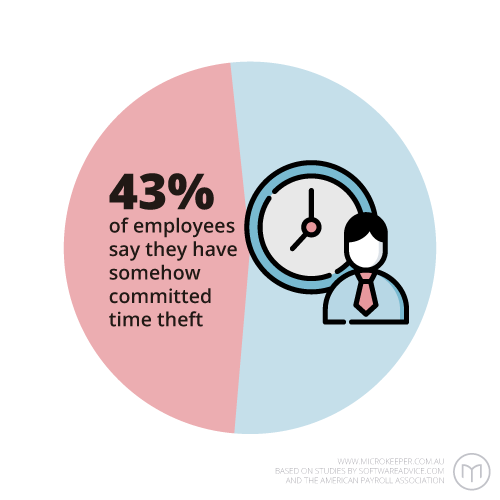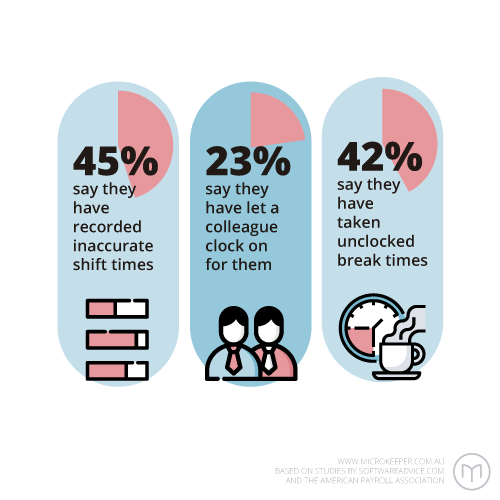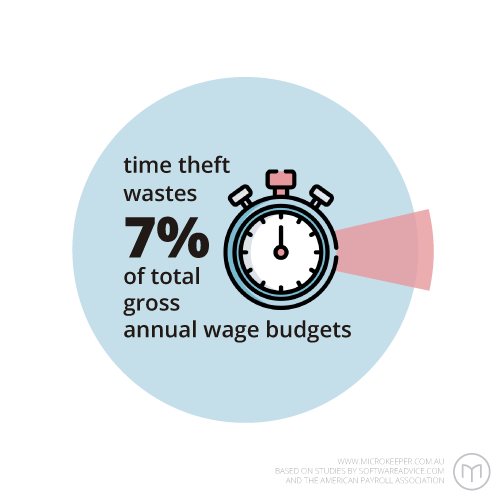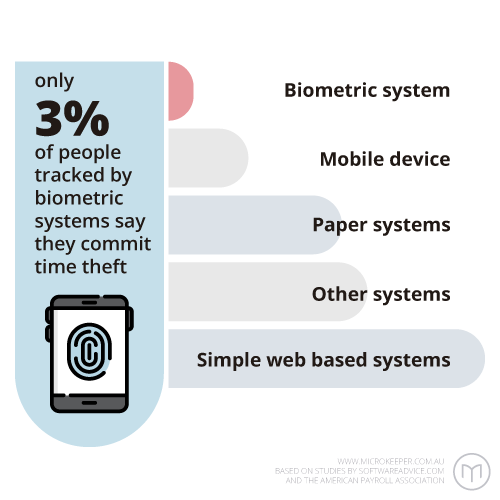How efficient software and cultural changes can prevent time theft.
Over the last few years, a handful of high-profile cases have put the spotlight on underpayment of workers, particularly in retail, agriculture and hospitality. Rightly so, compliance is utterly important and employee underpayment is a problematic issue.
But it’s also important to understand that wage theft is not a one-way street. Time theft alone is estimated to have a negative impact of 5 to 7% of a company’s gross payroll annually.
How does time theft work?
Time theft happens when employees are getting paid for time they have not actually worked. It is not always intentional but, especially when it is, it can have a big impact on your business. I first experienced it at my first job, working in the kind of supermarket that gets surprise visits from Jaimie Oliver or Curtis Stone.
When a colleague was retiring, he decided to let me in on a secret. For the last few years, he had consistently been "popping in" on Sundays when he wasn't rostered on. He would make up an excuse, he was "just saying hi" or "picking up a bag he forgot earlier". Meanwhile, he would sneakily clock in. Later in the day, he would repeat the same strategy to clock out.
For years he had been using this technique to get paid an extra day's work, with the added benefit of Sunday's penalty rates. No one had ever picked up on it.
There's a genuine possibility this individual case cost the business upwards of $25,000 every year. To put that in perspective, that's the price of a decent car or over two thousand kilos of Swedish meatballs. Imagine being able to access that amount (of money, not meatballs) when balancing the books. It could make a huge difference.


How can software help prevent time theft?
To slightly misquote Dwight Schrute: "Time theft is not a joke, Jim! Millions of businesses suffer every year!"
It can, however, go unnoticed easily when there's no integration between rostering, time clocking and payroll. When all these systems work separately or are only partially integrated you are left with the tedious task of manually drudging through paperwork, excel spreadsheets or clicking in and out of different software windows. allowing discrepancies or inconsistencies to go unnoticed and unchecked.
Adopting a good software system which combines rostering, timesheets and payroll offers an easy solution. Microkeeper is the best all-in-one payroll software in Australia (we're a bit biased, but still) and we've effectively helped save some of our clients thousands of dollars by identifying cases of time theft by implementing our software.
Red flag roster
Our system has an easy time and attendance overview page which indicates when time is worked outside of rostered hours. It'll jump out with a clear red colour, flagging the extra time allowing managers to review.
Case in point, the manager of a retail store using Microkeeper noticed a staff member consistently had an hour of "red time" before their shift started. They decided to investigate further and visit the store location during the time in question. Upon arrival they found the store closed, and no one around. Although the employee was clocked on at work, they were, in fact, enjoying a coffee and eggs on toast down the road. Excellent choice in breakfast foods, but you'd be struggling to classify it as "working".
After addressing the situation and talking things through, the red time disappeared.
 A sample of how time theft would look in our system.
A sample of how time theft would look in our system.
Bye bye buddy punch
Another bow in the Microkeeper time theft prevention arrow is biometric time-clocking. Bio-what now? You say? Biometric time clocking makes buddy punching (getting your mates to clock on for you) practically impossible. It's a quick system, which uses your fingerprint to clock in and clock out at the location of work. In some of our case studies, we've seen clients save over $15,000 yearly by installing our fingerprint clocking consoles. Our data indicates the scanners actively discourage early arrivals, early departures, and unauthorized overtime.
Real data makes a real difference
The third benefit of Microkeeper’s integrated cloud payroll software is that it allows you to evolve your rosters and business operations based on real data. For example, if staff are constantly staying an extra 15 minutes on a Friday closing shift it could indicate customers are out and about later. By extending business hours you could capture the increase store traffic and avoid staff ‘staying back’ by rostering to reflect updated hours.
Breaking bad
Lastly there’s a tricky one which sometimes goes unnoticed. Depending on your current setup and your staff’s award rules, employees who forget to clock their breaks might get paid overtime at the end of the day as a result. Our system can automatically insert the agreed breaks making that extra cost a thing of the past.


| Can we help? Contact us today on 1800 940 838 or shoot us a message here to get started. |
How can you help minimise time theft?
Having a software solution to combat time theft will be able to resolve the problem, but it’s important you also handle the root cause.
Here are a few actions you can take to ensure the culture is addressed.
- Check if employees feel treated fairly. Often when stealing time, people warrant doing so because they feel like they’re “making up” for other things (e.g. low wage, extra time they’ve spent working during breaks or unpaid training). If people feel sufficiently rewarded for their work it will deter them from stealing time.
- Make sure managers are setting a good example. You or your managers might be on a salary and make up for “wasted” time long after traditional working hours, but staff might not always be aware of this. If managers take extended breaks, consistently show up late or leave early, it will make “cutting corners” feel acceptable amongst staff.
- Be clear about expectations. Sometimes, all you need is an open conversation. Most people aren’t aware of the impact of time theft. They might “buddy punch” because they want to be nice for a colleague or clock out late because they like chatting with other staff after the end of their shift. If you make people aware of the impact, things will likely get better. And while you don’t have to delve into the numbers, people are generally more motivated to do the right thing if they know why they’re doing it.
- Reward staff for doing the right thing. If time theft is a widespread issue, tackling it as a team might help. Try setting a goal of improving adherence to rosters and put some of the budget you free up toward investing in staff morale.
 Image CaptionHaving an open conversation about company culture can help. Photo by CoWomen on Unsplash
Image CaptionHaving an open conversation about company culture can help. Photo by CoWomen on Unsplash
Summary points:
Time theft occurs when employees are paid for time they have not actually worked.
The practice is costing your business money. Estimates range that the impact sits between 5-7% of a company’s gross payroll annually.
Microkeeper can reduce these payroll losses by:
- Automatically highlighting discrepancies between rostering and timesheets.
- Offering clocking methods which increase accuracy and significantly reduce the opportunity for employee time exploitation
- Capturing real data which can illuminate business operational trends allowing rosters to be created to accurately fulfil labour requirements and highlight potential opportunities.
- Automatically inserting breaks to avoid accidental recording of overtime.
As a business owner or manager, you can address culture by:
- Ensuring managers are setting the right example and making appropriate use of time.
- Making sure your staff feels fairly rewarded and appreciated.
- Having open communication about the impacts on your business and rewarding positive outcomes.
Time theft solutions reference table
Are these issues present in your business?
| Opportunities for time theft | Time theft solutions |
| Clocking non-rostered shifts | Set roster and use timesheet overlay |
| Buddy clocking | Biometric timesheet solution |
| Manual time cards | Time and attendance solution |
| Clocking on early or late for shifts | Timesheet vs roster comparison overlay |
| Extending break duration | Automate breaks based on award |
| Want to find out how Microkeeper can help? Contact us today on 1800 940 838 or shoot us a message here and we can get you on your way. |



.jpg)